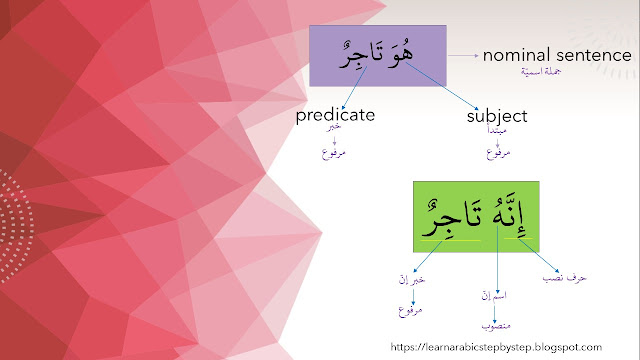Inna and La'alla - Durusul lughah book 2 - lesson 1
Start from today, we are going to learn Arabic lesson from the most known book among Arabic student, namely Durusul lughah al-arabiyyah.
We start from Durusul lughah volume 2, lesson 1. If you want to learn Durusul lughah book 1, you can learn them here.
Lesson 1 - Durusul lughah Book 2
Observe the picture below.
In the picture, you can read a conversation between teacher and student.
There are some sentences that is underlined. These are the subject that we are going to learn.
There are two words that we are going to learn, they are :
1. إِنَّ (inna)
2. لَعَلَّ (la'alla)
First of all, let's study إِنَّ
إِنَّ : the meaning, function, and the rules about inna
What is إِنَّ?
إِنَّ : حرف نَصْب
إِنَّ : ينصب الاسم وَ يرفع الخبر
Inna is harf nasb, it make ism (ism inna) in accusative case (mansub/مَنصُوب). Then it makes khabar inna in nominative case (marfu'/مَرْفُوع).
The function of إِنَّ
إِنَّ is used to emphasize a statement, emphasize your answer, or emphasize what you have just said.
Inna means : indeed, actually, really, certainly, definitely, surely, verily, no doubt.
The sentence examples of إِنَّ
inna which goes into pronoun or damir (ضمير)
- هُوَ تَاجِرٌ
The meaning: He is a merchant.
هُوَ تَاجِرٌ is nominal sentence (جملة اسميّة).
هُوَ in this nominal sentence is مُبْتَدَأ (subject), whereas تَاجِرٌ is خَبَر (predicate).
إِنَّ can go into nominal sentence, then مُبْتَدَأ becomes ism inna (اسم إنّ) and خَبَر becomes khabar inna (خبر إنّ).
When إِنَّ goes into this sentence, damir هُوَ becomes هُ , it is in accusative case. Then تَاجِرٌ is in nominative case.
Finally, the sentence becomes إِنَّهُ تَاجِرٌ (indeed, he is a merchant.)
Observe the picture below to summarize the explanation above.
هُوَ إِنَّهُ تَاجِرٌ
هُمَا إِنَّهُمَا تَاجِرَانِ
هُمْ إِنَّهُمْ تُجَّارٌ
هِيَ إِنَّهَا تَاجِرَةٌ
هُمَا إِنَّهُمَا تَاجِرَتَانِ
هُنَّ إِنَّهُنَّ تَاجِرَاتٌ
أَنْتَ إِنَّكَ تَاجِرٌ
أَنْتُمَا إِنَّكُمَا تَاجِرَانِ
أَنْتُمْ إِنَّكُمْ تُجَّارٌ
أَنْتِ إِنَّكِ تَاجِرَةٌ
أَنْتُمَا إِنَّكُمَا تَاجِرَتَانِ
أَنْتُنَّ إِنَّكُنَّ تَاجِرَاتٌ
أَنَا إِنَّنِي تَاجِرٌ
نَحْنُ إِنَّنَا تُجَّارٌ
notes:
إِنَّنِي can be replaced with إِنِّي
إِنَّنَا can be replaced with إِنَّا
inna which goes into noun
- المُدَرِّسُ جَدِيْدٌ
The meaning: The teacher is new.
المُدَرِّسُ جَدِيْدٌ is nominal sentence (jumlah ismiyyah).
المُدَرِّسُ in this nominal sentence is subject or mubtada', whereas جَدِيْدٌ is predicate or khabar.
When إِنَّ go into this sentence, المُدَرِّسُ is no longer called mubtada', it becomes ism inna, and جَدِيْدٌ becomes khabar inna.
So, المُدَرِّسُ is in accusative case (mansub) => المُدَرِّسَ (al-mudarrisa), whereas جَدِيْدٌ is in nominative case (marfu') => جَدِيْدٌ
Finally the sentence becomes => إِنَّ المُدَرِّسَ جَدِيْدٌ (indeed, the teacher is new).
Observe the summary in the picture below.
لَعَلَّ : the meaning, function, and the rules about la'alla
What is لَعَلَّ?
لَعَلَّ : حرف نَصْب
لَعَلَّ : ينصب الاسم وَ يرفع الخبر
la'alla is harf nasb, it make ism (ism la'alla) in accusative case (mansub/مَنصُوب). Then it makes khabar la'alla in nominative case (marfu'/مَرْفُوع).
لَعَلَّ is also a particle like إِنَّ , it is called sister of inna. Gramatically, it acts like inna.
The function of لَعَلَّ
لَعَلَّ is used to express a hope, expect, or wish.
la'alla means : hope, expect, wish.
The examples of لَعَلَّ
la'alla which goes into pronoun or damir (ضمير)
- هُوَ نَاجِحٌ
The meaning : He is a successful person.
When لَعَلَّ goes into this sentence, the final sentence becomes:
لَعَلَّهُ نَاجِحٌ => I hope he will succeed (I hope he will become a successful person).
Notes:
- la'alla has same pattern with inna.
For examples:
أَنْتَ = إِنَّكَ = لَعَلَّكَ
هُوَ = إِنَّهُ = لَعَلَّهُ
أَنْتُمْ = إِنَّكُمْ = لَعَلَّكُمْ
and so on.
la'alla which goes into noun
- التَّاجِرُ غَنِيٌّ
The meaning : The merchant is rich.
When la'alla goes into this sentence, the final sentence becomes:
لَعَلَّ التَّاجِرَ غَنِيٌّ => I hope the merchant is rich.
التَّاجِرَ is ism la'alla so it is in accusative condition (mansub), whereas غَنِيٌّ is khabar la'alla so it is in nominative case (marfu').
Summary of la'alla
We will continoue on the next lesson, in shaa Allah.







No comments:
Post a Comment